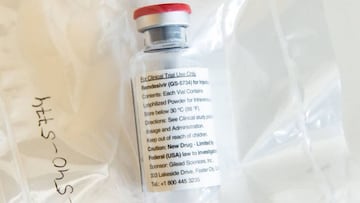What is remdesivir and how does the drug treat coronavirus?
Health officials in the US have announced that the Trump administration has bought almost the entire world’s stock of the drug.

Remdesivir is an experimental antiviral drug first created and developed by the biopharmaceutical company Gilead Sciences in 2009. It was originally created to treat hepatitis C but proved ineffective. Since then, it has been used to treat Ebola but didn’t work well against that disease either.
Despite this, remdesivir later showed promise in fighting SARS and MERS, illnesses caused by coronaviruses, in animal studies, which is why researchers thought remdesivir might help fight the new coronavirus.
According to the US government, the cost is around $3,200 per treatment of six doses and it is designed to block some viruses, including Covid-19, from duplicating themselves and therefore overwhelming the host’s immune system.
The drug works differently to other antibody-based treatments or vaccines, which are designed to help a person’s immune system identify and eliminate pathogens. Despite its ability to shorten the recovery times of some coronavirus patients, remdesivir has not been found to significantly improve an individual’s chances of surviving the disease.
- What is remdesivir and how does the drug treat coronavirus?
- Can coronavirus be spread through the air?
- Trump approves 5-week PPP extension for small business loan applications
- Swine flu virus in China: what is G4 EA H1N1 and why does it have pandemic potential?
- Dr. Fauci's recommendations to stop the Covid-19 crisis
US is hoarding remdesivir
The White House said that the US secured half a million doses for Americans and health experts criticized the US decision to hog nearly the entire global supply of remdesivir, the only drug licensed so far to treat Covid-19.
Related stories
The US government announced on Tuesday that President Donald Trump had struck “an amazing deal” to buy the drug for Americans, made by Gilead Sciences. The Department of Health and Human Services (HHS) said Trump has secured 500,000 treatments of the drug through September, representing 100 per cent of Gilead’s July production capacity and 90 per cent of its capacity in August and September.
“The Trump administration is doing everything in our power to learn more about life-saving therapeutics for Covid-19 and secure access to these options for the American people,” HHS said in a statement.